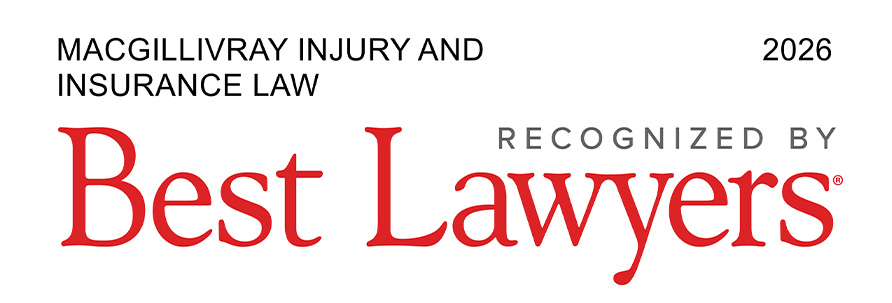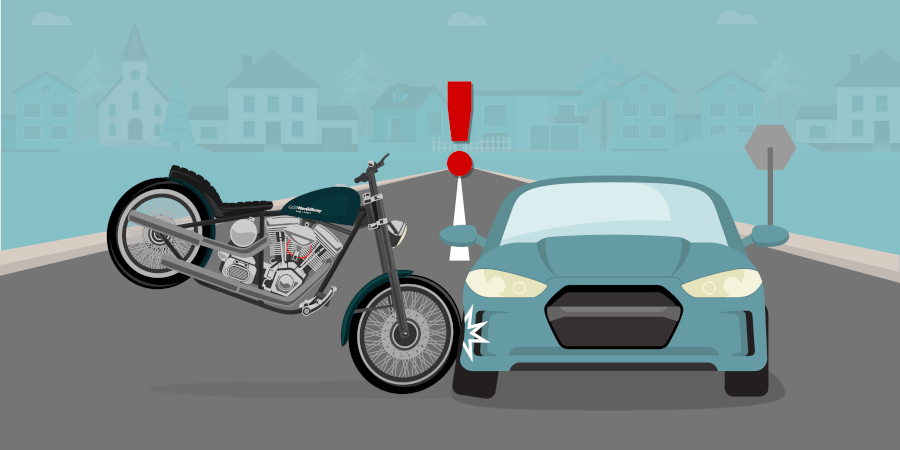




Suing after a motorcycle accident
In New Brunswick, where motorcycles are a popular mode of transportation and recreation, it’s important to be aware of the risks and take necessary precautions when setting out for a ride.
For 30 years at MacGillivray Law, we’ve been helping people recovering from motorcycle accidents receive the compensation they deserve. If you or a loved one have been injured in a motorcycle accident, contact us today for a free consultation.
What should you do after a motorcycle accident has occurred?
After a car accident in New Brunswick, your first priority is safety. Once everyone is out of danger, take the following steps to protect your health, your rights, and any potential insurance claim:
- Ensure safety and call for help: Check yourself and others for injuries. Motorcycle accidents often result in serious harm, so call 911 immediately, even if you injuries don’t seem severe. If you’re able, move off the road to a safe area to avoid further danger. Turn on hazard lights if a vehicle is involved and it’s safe to do so. Stay calm and wait for emergency responders.
- Exchange information: Get the contact and insurance details of all other parties involved, including full names, phone numbers, driver’s license numbers, license plate numbers, Insurance providers and policy numbers. This information is essential for filing an insurance claim or potential legal action.
- Gather evidence: Take photos or videos of your motorcycle, other vehicles, the scene, and any visible injuries. Document the time, location, weather, and road conditions. If there were witnesses, collect their names and contact information. These details can help determine how the accident occurred and support your version of events.
- Report the accident to police: In New Brunswick, you are legally required to report an accident to the police if anyone is injured or if property damage exceeds $1,000. Even in less severe cases, a police report offers an unbiased record that can help clarify fault and strengthen your claim.
- Notify your insurance company: Call your motorcycle insurance provider as soon as possible to report the accident. Provide only the basic facts of the incident. In New Brunswick, you may qualify for Section B benefits, which can help cover: medical treatment, lost income and rehabilitation expenses. Timely reporting is often required by insurance policies and it ensures you can access benefits like vehicle repairs and medical coverage.
- Seek medical attention: Even if you feel okay, you should see a doctor. Injuries such as internal bleeding, soft tissue damage, or concussions may not be obvious right away. A medical exam can protects your health, and create a record of your injuries, which is vital for any insurance or legal claim.
Can you sue after a motorcycle accident?
Yes, in New Brunswick you can claim against the driver who caused your injuries after a motorcycle accident. First, you must prove the other party is at fault and then provide evidence of your injuries.
Can a motorcycle rider sue even if they are partially at fault for an accident?
Yes, if a motorcycle rider is partially at fault for an accident, they can still sue the other at fault driver. In New Brunswick, “contributory negligence” is used to determine liability and allocate responsibility between parties involved in an accident. Contributory negligence means that the court or insurance companies will assess the degree of fault for each party involved in the accident and assign a percentage of responsibility. If a motorcycle rider is found partially at fault, their degree of fault will be considered when determining the damages and compensation.
According to the Contributory Negligence Act, RSNB 2011, c 131, in situations where two or more individuals are at fault for causing damage or loss, the responsibility to compensate for the damage or loss is determined based on the proportion of fault attributed to each person. However, if it is not possible to establish varying degrees of fault considering all the circumstances, the liability will be equally divided among the parties involved.
If a motorcycle rider is found partially at fault for an accident, their compensation may be reduced by the percentage of fault assigned to them. For example, if the total damages amount to $100,000 and the rider is assigned 25% fault, their compensation may be reduced by 25%, resulting in a total award of $75,000.
The following case is an example of a motorcycle accident where the Court took contributory negligence into account.
In Parker v. Belzile, [1993] N.B.J. No. 410, Parker, the motorcycle driver, signaled his intention to turn left but failed to check his rear-view mirror and was rear-ended by the Defendant driver who was attempting to pass him. Parker suffered fractures to his arm, broken ribs, and a crushed ankle and missed 18 months of work. The Court attributed 40% of the fault to Parker, and therefore reduced his damages award accordingly.
If you believe you are partially at fault for a motorcycle accident, it is crucial to consult with an experienced personal injury lawyer. They can provide guidance, protect your rights, and help navigate the legal process to ensure your interests are properly represented. Book a free consultation to speak with our experienced motorcycle lawyers.
When is another driver at fault for a motorcycle accident?
Another driver is at fault when their substandard driving caused or contributed to the accident. The standard for driving in New Brunswick is determined by referencing the rules in the Motor Vehicle Act, SNB 1973, c M-17, and past case law.
Examples of where another driver could be at fault include:
- Cars making left hand turns: Some drivers may not notice an oncoming motorcycle and proceed into their path of travel.
- Distracted driving: Drivers engaging in activities such as texting, talking on the phone, or eating while driving can easily miss motorcycles on the road, leading to collisions.
- Speeding: Excessive speed reduces the time drivers have to react to motorcycles, increasing the likelihood of accidents.
- Failure to yield right of way: Drivers who fail to yield to motorcycles at intersections or when changing lanes are a significant cause of motorcycle accidents.
- Impaired driving: Alcohol, drugs, or other substances impair a driver’s judgment and reaction time, significantly increasing the risk of accidents involving motorcycles.
- Improper driving for road or weather conditions: Hazards like potholes, loose gravel, or debris on the road can be particularly dangerous for motorcyclists, especially when drivers take action to avoid hazards without regard for nearby motorcyclists.
- Inexperienced drivers: Motorcycles require specific skills and training to operate safely. Inexperienced riders may lack the necessary knowledge to navigate challenging situations.
What kind of injuries can someone in a motorcycle accident get compensation for?
A person injured in a motorcycle accident in New Brunswick is entitled to compensation from the driver who was at fault for the accident. Common injuries for which motorcyclists get compensated include:
- Road rash
- Soft tissue injuries
- Serious fractures
- Spinal injuries and spinal cord injuries
- Damage to internal organs
- Burns
- Traumatic brain injuries and other head injuries
- Psychological trauma
Because of the lack of protection to the rider, motorcycle collisions can tragically not only result in catastrophic injuries, but often also result in fatalities. When a loved one has passed away in a fatal motorcycle accident, an experienced injury lawyer can help the deceased’s next of kin recover compensation from the negligent driver.
Are you entitled to no-fault or Section B insurance when you are in a motorcycle accident?
Yes, in New Brunswick, Section B no-fault benefits are mandatory and cover motorcycle accidents. Because motorcycles are considered motor vehicles under New Brunswick law, no-fault accident benefits – often called Section B – apply to individuals with motorcycle injury claims in the same way as they apply to those with traditional motor vehicle claims.
No-fault accident benefits are called ‘no fault’ because they apply to anyone with motor vehicle insurance, no matter which driver’s negligence caused the accident. This is also the case for motorcycle accident claims – motorcycle riders involved in collisions are eligible for Section B benefits under their motor vehicle insurance policy. Section B expenses can potentially cover medical costs, lost wages, and other expenses related to your accident.
For a more comprehensive explanation of Section B benefits, please see our Section B Benefits section.
If you are in a motorcycle accident, how can you prove you are not at fault?
You can show you did your best to prevent or minimize the effects of the motorcycle accident by:
- Showing photos of the protective gear you wore, including a helmet with eye protection
- Demonstrating your conduct of regular safety in performance checks before riding
- Practicing maneuvering skills in a private lot
- Explaining awareness of the “invisible motorcycle” phenomenon (perceptual blindness to motorcycles)
- Staying out of other drivers’ blind spots
- Avoiding lane splitting
- Staying alert
- Giving yourself time and space to react to dangerous situations on the road
Taking the steps above can prevent a motorcycle crash and eliminate the need for a personal injury lawyer altogether. However, if a motorcycle accident occurs, the injury lawyers at MacGillivray Law are ready to take on your legal claim and protect your interests.
Matthew’s story
Common questions about motorcycle accident injuries
Motorcycles are motor vehicles, and because of that, they are treated by the law the same as a car, truck, or any other motor vehicle on the road.
Visit our Motor Vehicle Accidents section for answers to common questions that apply to all motor vehicles, such as:
- What is the deadline on filing a motorcycle accident lawsuit?
- How much is my injury claim worth?
- What if the other driver is uninsured or unidentified?
- Should I accept the settlement my insurance company offers me?
- Do I have to make a statement to my insurance company?
- How long does a personal injury claim take to resolve?
Motorcycle riders are required to have insurance just like drivers of other on-road vehicles. When an insurance company denies a motorcycle accident claim, or liability for the accident is in question, a personal injury lawyer can help you get the compensation you deserve.
Are there New Brunswick court cases about motorcycle accident injuries?
Yes, there are published court decisions in New Brsunwick where motorcyclists received compensation through the Courts. Keep in mind that each case is unique, and no two situations will be identical. If you’ve been injured in a motorcycle accident, it’s important to get input from a lawyer. With the help of an experienced lawyer, most injury claims settle before they reach court.
In Edmondson et al. v. Edmondson et al., 2022 NBCA 4, Cory Edmondson took his 5-year-old son, Cole, for a motorcycle ride in the summer of 2010. To accommodate his son, Cory created a makeshift seat on the rear of the motorcycle using styrofoam, leather, and suction cups. However, the seat lacked a backrest, and Cole’s legs couldn’t reach the foot pegs. They set off on a single-lane highway in Fredericton, NB, with Cory driving at 75 km/hr in an 80 km/hr zone. Doreen Phillips, driving in the opposite direction, unexpectedly turned left across the path of Cory’s motorcycle. Unable to avoid a collision, the motorcycle struck the rear of Phillips’ car. Both Cory and Cole slid along the road while still strapped together and came to a stop under a vehicle following behind Phillips. Both Cory and Cole suffered severe injuries in the accident, with Cole sustaining a significant burn on his arm that resulted in nerve damage. Cory’s actions amounted to blatant negligence, as he placed Cole on a motorcycle not designed for passengers and rigged a makeshift seat that violated Section 199(1) of the Motor Vehicle Act. Cory breached the standard of care and other safety provisions of the Act, exposing Cole to an unreasonable risk of harm. The lack of evidence supporting any necessity or emergency further supported Cory’s liability. Cole’s injuries were a direct result of Cory’s negligence, and Cole was entitled to summary judgment against his father’s insurance company for liability.
In McDonald vs. Martin, [2019] N.B.J. No. 111, Ms. McDonald claimed damages for injuries sustained in a motorcycle accident where she was a passenger on the motorcycle driven by Mr. Martin. Ms. McDonald suffered road burn and fractures to her pelvis, left elbow, and ribs in the accident. The court awarded Ms. McDonald $90,000 for general damages, $37,862 for past and future loss of income, $40,836 for loss of future pension, and $59,182.18 for past and future cost of care.
Do I need a personal injury lawyer for my motorcycle accident in New Brunswick?
Motorcycle riders often suffer more severe injuries and face more legal challenges than drivers involved in car accidents. That’s why working with an experienced motorcycle accident lawyer in New Brunswick is so important. When your legal team begins handling your case, they will collect all essential documents to build a strong injury claim on your behalf. This includes your medical records, police report, and any witness statements.
Your lawyer will also take over communication with the at-fault driver’s insurance company, as well as manage most interactions with your own insurer. This helps reduce your stress and ensures that your rights are fully protected throughout the process. While you focus on your recovery, your legal team will fight for a fair settlement and make sure you have every possible advantage to receive the full compensation you deserve.
Don’t navigate the legal process alone! Contact our motorcycle accident lawyers today for a free consultation and get the support you need to move forward with confidence.
Relevant legislation
Motor Vehicle Act, RSNB 1973, c M-17.
Contributory Negligence Act, RSNB 2011, c 131.
Have questions for our team?
Frequently Asked Questions
What Our Clients Say...
Request a
Free Consultation
If you would like to learn your legal options at no obligation, contact us today to set up a free consultation.



